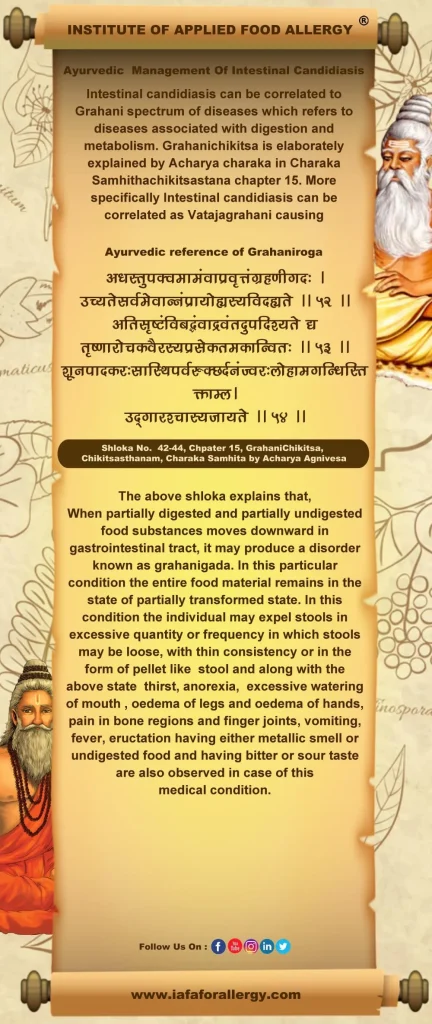On This Page
About Intestinal Candidiasis
अधस्तुपक्वमामंवाप्रवृत्तंग्रहणीगदः |
उच्यतेसर्वमेवान्नंप्रायोह्यस्यविदह्यते ||
Intestinal Candidiasis is a normal gut fungus but its proliferative excess causing infection is associated with immune suppression or long term use of broad spectrum antibiotic. It is also called Candida albicans and Gastrointestinal Candidiasis. Candidiasis can occur in various body candidiasis in gastro intestinal tract include oesophagus, stomach, and small intestine. Intestinal candidiasis usually occur secondary to some underlying pathology.
Etiology of Intestinal Candidiasis
Intestinal candidiasis may be caused due candida infection in ulcers, malignant perforation, small or large bowel infection, superficial erosion, pseudo membrane formation particularly by use excess of antibiotics, immune suppressive drugs, diabetic medication, oral contraceptive pills, corticosteroids, stress, smoking etc. Patients suffering from chronic illness, irritable bowel disease, Crohn’s disease, ulcerative colitis are more prone to develop Intestinal candidiasis.
Diagnosis of Intestinal Candidiasis
Endoscopy findings show white plaques in duodenum and thickening of mucosal folds of duodenum and jejunum. Stool examination reveals presence of Candida.
Preventive Measures of Intestinal Candidiasis
- Avoid stale, refrigerated, processed, sugary foods.
- Quit smoking, alcohol consumption, antibiotic overuse, corticosteroids and immunosuppressive drugs.
- Keep blood glucose levels at check.
Complications of Intestinal Candidiasis
- Candida infection spreading to blood stream can cause serious health hazards like brain damage, liver dysfunction etc.
Symptoms of Intestinal Candidiasis
- Anal itching
- Belching
- Bloating
- Indigestion
- Nausea
- Diarrhoea, foamy or frothy stools
- Crump
- Vomiting
- Gastric ulcers
- Headache, fatigue
- Itchy skin
- Mucus rich thread like foamy substance in stool
Ayurvedic Management of Intestinal Candidiasis


“Dr. Gupta’s IAFA is the best Ayurveda centre for the treating Intestinal candidiasis through natural friendly Ayurvedic measures”.
Reach Institute of Applied Food Allergy® for a natural friendly and Ayurvedic skin rejuvenation!!!
– Dr. Sahil Gupta (B.A.M.S., M.H.A.)
Ayurvedic Allergy Specialist
CEO & Founder of IAFA®
At last, Easier Intestinal Candidiasis Management

Trusted by
More than 90,000 Patients

Convenient
at-Home Treatments

9.2 / 10
Customer Satisfaction Score
Treatment Principle
- Vishamagni Chikitsa
- Vatajagrahani Chikitsa
Internal Medicines
- Triphala Churna
- Mustakaranjadi kashayam
- Vilwadi Gulika
- Charngeryadi Gritam
- Panchamrta Parpadi
- Grahanyantaka Grita
- Kaidaryadi Kasayam
External Application
- Dhanwantaram oil on umbilical region
Purifactory Therapy
- Vasti –Pippilyadianuvasanataila
Single Herbs Used in Intestinal Candidiasis
- Haridra (Curcuma longa)
- Ardraka (Zingiber officinale)
- Ajamoda (Trachyspermum ammi)
Diet in Intestinal Candidiasis
Pathya (Do’s)
- Low carbohydrate easy to digest vegetarian diet.
- Proper skin hygiene to prevent Candida spread.
Apathya (Don’ts)
- Avoid day sleep
- Avoid Vidahiahara (Acidic food)
- Avoid Yougurt, oily, spicy, non vegetarian and deep fried food.
Yoga
- Pavanamuktasana
- Trikonasana
- Paschimootasana
- Ustrasana
- Bujangasana
Pranayama
- Anuloma viloma pranayama
- Kapalbhati
- Nadi shodana
Mudra Therapy
- Prithvi mudra
- Prana mudra
- Varuna mudra

Frequently Asked Questions
Question) What is intestinal candidiasis?
Answer) The candida alibicans fungal infection of any part of the intestine is called as Intestinal candidiasis.
Question) What are the major basic conditions that may lead to the infection by candida albicans and causes intestinal candidiasis?
Answer) Intestinal candidiasis may be caused due candida infection in ulcers, malignant perforation, small or large bowel infection, superficial erosion, pseudo membrane formation particularly by use excess of antibiotics, immune suppressive drugs, diabetic medication, oral contraceptive pills, corticosteroids, stress and smoking.
Question) Is there any Ayurvedic remedy for Intestinal candidiasis?
Answer) Yes, Ayurveda has successful natural friendly measures for treating intestinal candidiasis.
Question) What is the cause of Intestinal Candidiasis?
Answer) According to Ayurveda, candidiasis can thrive in the body due to agnimandya (weak digestive fire). Due to weak digestive fire, the undigested food putrefies and ferments creating suitable conditions for the yeast to grow and spread.
Question) What is the treatment of Intestinal Candidiasis?
Answer) The modern treatment of Intestinal Candidiasis includes medications that can make the symptoms disappear for a while but the Ayurvedic treatment treats the underlying cause of candidiasis with herbal remedies, diet and lifestyle management.
Question) What are the herbs useful in Intestinal Candidiasis?
Answer) Various herbs such as- Triphala, Neem (Azadirachta indica), Musta (Cyperus rotundus), Licorice (Glycyrrhiza glabra), Vidanga (Embelia ribes) etc. are effective.
Question) What is the recommended diet in intestinal candidiasis?
Answer) Freshly cooked, warm, seasonal and fresh food with spices such as ginger, turmeric, cumin, garlic should be included in the diet and intake of cold foods, drinks, left-overs, heavy and fermented food should be avoided.
References
- Shloka No. 42-44, Chapter 15, Grahani Chikitsa, Chikitsasthana, Charak Samhita by Acharya Agnivesa.
- Dr. L. Dwivedi. Sutrasthanam 6/34 & 41, Chikitsasthanam 6/46-48. Verse 4th, Varanasi: Chaukhambha Krishnadas Academy; 2017
- Agnivesha, Charak Samhita with Ayurveda Deepika Commentary of Chakrapanidatta revised by Charak and Dridhabala, edited by Vaidya Trikamji, published by Chaukhambha Publishers, reprint – 2015, Chikitsathana 7/159-161.
Conclusion
Intestinal candidiasis is a disease which is usually undetected until severe stage is reached. If not treated at the right time it may lead to serious health conditions especially due to spread of candida fungi through the blood stream. The minor symptoms of candidiasis shown in the initial stage of disease have to be taken seriously and treated appropriately. Following Ayurveda will help in better healing and recovery through safe and complete nature friendly treatment modalities.
Dr. Gupta’s IAFA is the best Ayurveda centre for the treating Intestinal candidiasis through natural friendly Ayurvedic measures.
Reach Institute of Applied Food Allergy® for a natural friendly and Ayurvedic skin rejuvenation!!!
Was this Page Helpful?
So IAFA Root-Cause Treatment of Your Intestinal Candidiasis is Just 3 Steps Away!

01. Connect With Us
Share your history of illness or Book your appointment

02. Consult With Us
Dr. Gupta a certified Ayurvedic Allergist Consultant

03. Root Cause Treatment
Get an accurate diagnosis, medicines, diet & lifestyle change
Intestinal candidiasis- Case Studies
Real Case Studies of Successfully Treated Patients from All Around the World by IAFA Ayurveda®

9 Year Old Female Patient Recovered from Chronic Allergic Bronchitis – A Case Study
This case study presents a 9-year-old female patient who has successfully recovered…

12-Year-Old Child Recovered from Sun Allergy and Polymorphous Light Eruption (PMLE) – A Case Study
This is a case study of a 12-year-old child who has successfully…

40-Year-Old Female Patient Recovered from Dyshidrotic Eczema and Onychomycosis – A Case Study
This case study highlights the successful recovery of a 40-year-old female patient…

40-Year-Old Female Patient Recovered from Urticaria and Angioedema – A Case Study
This case study focuses on a 40-year-old female patient who has successfully…
Read More Articles

High Immunoglobulin-E (IgE) Levels
Discover Ayurvedic treatment for high Immunoglobulin-E (IgE) levels. Learn about the causes,…

Histamine Intolerance
Discover Ayurvedic treatment for histamine intolerance, its causes, symptoms, and natural treatment.…

Allergic Asthma
Discover Ayurvedic treatment for allergic asthma, including causes, symptoms, and effective remedies…













